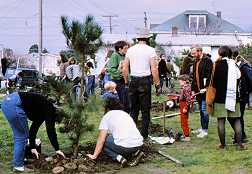Bernard Marszalek
Bernard Marszalek
Anarchy for Kids
A Review of Colin Ward’s Essays
A review of Autonomy, Solidarity, Possibility: The Colin Ward Reader
Damian White (Editor), Chris Wilbert (Editor), and Colin Ward, Paperback, 375pages, AK Press (Edinburgh, Oakland, Baltimore), 2011, $21.95
This large collection of essays by Colin Ward, his last publishing effort before he died last year at the age of 84, affords those who know him only as the author of the ever-popular Anarchy in Action (now in print for almost 40 years!) with an in-depth view of his many interests.
Sep 9, 2013 Read the whole text...
Bernard Marszalek
Beyond Automation
50 Years Later & The Rise of the Precariat
The effect of automation on employment was first brought to the public’s attention by a 1964 report, The Triple Revolution, issued by a California-based liberal think tank, the Center for the Study of Democratic Institutions.
The report asserted that technological developments were leading to almost unlimited productive capacity. But this was also reducing the number of manual jobs needed, increasing the level of skills needed for available jobs, and creating much more unemployment.
May 26, 2016 Read the whole text...
Bernard Marszalek
Fifty Years Ago
The Origins of Berkeley’s Ohlone Park

Bay Area Rapid Transit (BART), in the late 1960s, demolished 200 Berkeley homes to trench and submerge their rail system. BART then filled in tons of dirt on top of the tube it built and in this way “reclaimed” the land that it bulldozed.
It strip-mined Berkeley to submerge the trains and above left four blocks along Hearst Avenue a barren, ugly field of dust in summer and mud in winter. An eyesore. BART officials said that they didn’t have funds (or mental bandwidth?) to develop it, that is, monetize it.
Sep 6, 2019 Read the whole text...
Bernard Marszalek
Happy Birthday, King Ludd!
The Luddites’ 200th birthday
In the waning moonlight, three bands of sullen men with ash-blackened faces stealthed through the woods and dales of central Yorkshire, one of the first counties in England to industrialize.
Quietly, the three groups, each traveling from different villages, picked themselves through paths they traversed since childhood and assembled in a clearing near their target. Though they passed outlying cottages, no dogs betrayed them.
Oct 11, 2013 Read the whole text...
Bernard Marszalek
I was corrupted by MAD (magazine)
MAD, the wildly satirical humor magazine, was my primer for critical thinking in my early teens. This may seem an odd statement given the vacuous contents of the current magazine, but today’s MAD is a pale reflection of its initial 1950s issues. We could say that it has been “neo-liberalized” like all mainstream media.
Dec 15, 2013 Read the whole text...
Bernard Marszalek
The ‘60s, 40 Years Later
No Chicago in Denver
Forty years ago, like today, the country found itself in an unpopular war of imperial domination to vanquish, not “Islamo-Fascism,” but Communism. And, like then, the political system was thoroughly corrupt and in the hands of a cabal of stooges with nightmarish plans.
Like so many others, when an election year rolls around and party politics rules the “news” with its loathsome trivia and journalistic manipulations, I long for refuge in an idyllic retreat deep in a forest far away from all media. But that isn’t an option for me, nor, I suspect for most people.
Aug 21, 2014 Read the whole text...
Bernard Marszalek
The Museum of Capitalism
An Oakland pop-up project exhibits the economy
The Museum of Capitalism (MOC), in Oakland, California, was a provocation not solely for being situated in the Jack London waterfront district, a gentrified marina area, but also for occupying a white elephant of a building erected just as the entire US economy collapsed.
The so-called Great Recession of 2007 could just as appropriately be called the Great Economic Coma, and the capacious future food market that the Museum reclaimed for its quarters, stands as the unintended main exhibit—a cadaver of capitalism.
Nov 15, 2017 Read the whole text...
